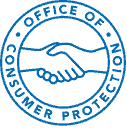Robocalls
Robocalls are unsolicited telephone calls placed by a computerized auto dialer to either deliver a pre-recorded message or identify that a person has answered a call and is available for a telemarketer or scammer to begin a sales pitch or scam. Robocalls are a top complaint category at consumer protection agencies and the problem continues to grow.
Here are some things to know about robocalls:
- Robocalls trying to sell you something are illegal unless the company has your written permission to call you for that purpose.
- Robocalls are permitted for political calls about candidates running for office, charities asking for donations, informational calls such as a flight delay, appointment reminders, and debt collection calls.
- Do not answer calls from unrecognized numbers.
- If you answer a call and there is silence, HANG UP. Do not speak or press any buttons on your phone.
- Consider call blocking solutions. There are telephones that offer call screening options, and telephone providers also offer filter services. Call your provider for information on the services they offer.
- Register on the Do Not Call Registry. This free service is provided by the Federal Trade Commission (FTC) and requires legitimate companies to not call your registered number for sales calls. Please read our Do Not Call Registry below for additional information.
Spoofing
"Spoofing" occurs when a caller deliberately falsifies the information transmitted to your caller ID display to disguise their identity. Spoofing is often used as part of an attempt to trick someone into giving away valuable personal information so it can be used in fraudulent activity or sold illegally.
Under the Truth in Caller ID Act, FCC rules prohibit any person or entity from transmitting misleading or inaccurate caller ID information
with the intent to defraud, cause harm, or wrongly obtain anything of value. If no harm is intended or caused, spoofing is not illegal. Anyone who is illegally spoofing can face penalties of up to $10,000 for each violation. In some cases, spoofing can be permitted by courts for people who have legitimate reasons to hide their information, such as law enforcement agencies working on cases, victims of domestic abuse or doctors who wish to discuss private medical matters.
If you receive a call and you suspect caller ID information has been falsified, or you think the rules for protecting the privacy of your telephone number have been violated, you can
file a complaint with the FCC
.
"Robocalls" are unsolicited prerecorded telemarketing calls to landline home telephones, and all autodialed or prerecorded calls or text messages to wireless numbers, emergency numbers, and patient rooms at health care facilities. The FCC adopted new rules to allow voice service providers to proactively block certain types of robocalls, e.g., from numbers that cannot make outgoing calls.
Do Not Call Registry
Are you tired of getting unwanted telemarketing calls? The Federal Trade Commission (FTC) is responsible for the National Do Not Call Registry that was created to help manage telemarketing calls. Telemarketers are required to search the Do Not Call Registry every 31 days and remove registered numbers from their calling list.You can register for the Do Not Call List online or call toll-free, 1-888-382-1222 (TTY 1-866-290-4236) from the number you wish to register. You may also place your cell phone number on the Do Not Call Registry. Registration is free.
Things you should know about the Do Not Call List:
- Once your number has been on the registry for 31 days, most telemarketing calls will stop.
- Only legitimate companies use this list. You will not be removed from the telephone lists of crooks and scammers!
- Not all callers are required to use the list. You may still receive calls from/or on behalf of political organizations, charities, and telephone surveyors.
- You will also continue to receive calls from companies with whom you have an existing business relationship. A company may call you for 18 months after you make a purchase or three months after you submit an inquiry or application.
- You may also receive calls from companies you have given permission to call.
Resources
- FTC: How to Block Unwanted Calls
- FTC: National Do Not Call Registry
- FTC: Phone Scams
- Office of Consumer Protection: File a Complaint
- FTC: Report Fraud
